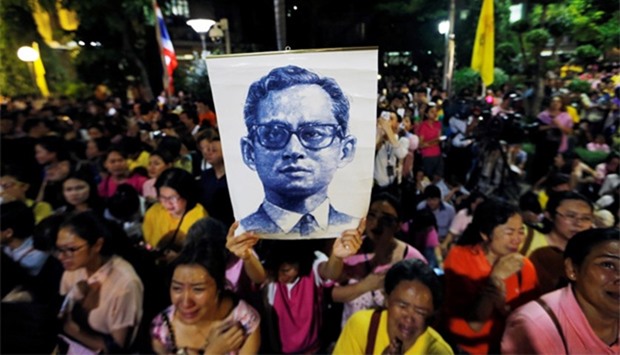Although the king's health has been deteriorating for years, the palace has never made public plans for how a royal succession will unfold.
As a result little is known about how the country will cope as it faces its first change of crown in 70 years.
Complicating the matter is a draconian royal defamation law that bars criticism of the monarchy and makes it fraught, if not criminal, to publicly discuss a future without him.
Here is what is known about the watershed moment in Thailand's history.
Who is the heir? The crown prince is his only son, 64-year-old Crown Prince Maha Vajiralongkorn.
Shortly after his father's death was announced, Prime Minister Prayut went on all Thai television stations to say that parliament would be informed later in the evening that Bhumibol had appointed Vajiralongkorn to succeed him.
Bhumibol was also named king in 1946 on the same day that his older brother was found dead in mysterious circumstances with a single gunshot to head.
But in Thailand there is often a gap, sometimes of many years, between assuming the throne and being crowned.
Vajiralongkorn does not enjoy his father's level of popularity and analysts say it is difficult to predict what kind of king he will be.
The heir has spent significant periods of his adult life in Europe, though he has taken on more royal duties at home in the twilight of his father's reign.
How would succession effect ordinary Thais? An outpouring of grief is expected to be profound.
‘With the passing of this monarch, psychologically Thailand will be absolutely transformed,’ David Streckfuss, an expert on the Thai monarchy, told AFP.
Many Thais worship the king with a near-religious fervour and can be brought to tears when asked to describe their devotion.
His portrait hangs inside many homes and on streets across the nation. Cinemagoers stand for the royal anthem before every screening.
The lese majeste law has shielded the monarch from overt criticism while a well-oiled palace publicity machine extolled him as a semi-divine moral leader and champion of the poor.
Some credit the king with binding the polarised country together across seven decades of political upheaval.
‘People have anxieties and apprehensions about the near future because the king's role in the past has been so indispensable and instrumental in seeing Thailand climb from being a backwater village to a modern nation,’ said Thitinan Pongsudhirak, a politics expert at Chulalongkorn University.
Is unrest likely? Probably not given the military is still in firm control of the kingdom since its 2014 coup.
The generals have clamped down on dissent and ramped up lese majeste prosecutions, with people behind bars for even tangential criticism of the king.
Paul Chambers, an expert on the Thai military, predicted an ‘intensified military clampdown and a possible delay to the return to democracy’.
The junta has promised elections in late 2017, but its timeline keeps slipping.
Thailand's military has long cast itself as a defender of the monarchy and lese majeste prosecutions have surged under junta rule.
‘Most signs point to a stable royal succession,’ risk consultancy firm Eurasia Group said in a note to clients this week.
What about business? Given the sensitivity of the issue, government and palace officials did not release any information on plans for the king's passing and the recent health scare caused market jitters.
In his television address, Prayut said Thai government officials and state enterprise employees would hold a one-year mourning period and invited all Thais to do the same.
Schools and businesses are likely to shut down for the coming days.
But the Thai government is aware that any prolonged closure of businesses and government ministries could hit the already struggling economy, especially as peak tourist season begins in December.
It is tradition to keep the bodies of royal family members and Buddhist leaders for months before their eventual cremation.
In the past, royal funerals have involved lavish, large-scale processions of monks and soldiers with thousands of black-cad Thais thronging the streets.

